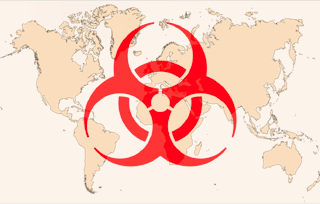Professional epidemiologists are often called on to investigate outbreaks and epidemics. This course serves as an introduction to the essentials of investigation, identifying pathogens, figuring out what's going on, reporting, and responding. You'll learn how to ask precise epidemiologic questions and apply epidemiologic tools to uncover the answers. You'll also learn about basic epidemic dynamics and the terrible law that cause them to grow, as well as the reasons why they recede and eventually go away. The course concludes with deep dives into some real outbreaks from Ebola, in West Africa, to the opioid epidemic in the United States.

Outbreaks and Epidemics

Outbreaks and Epidemics
This course is part of Epidemiology in Public Health Practice Specialization

Instructor: Justin Lessler, PhD, MS
18,552 already enrolled
Included with
774 reviews
What you'll learn
Apply methods to weigh evidence and calculate measures
Discuss outbreaks and the key epidemiologic tools used during investigation
Apply basic epidemic dynamics to the analysis of outbreaks
Skills you'll gain
Details to know

Add to your LinkedIn profile
4 assignments
See how employees at top companies are mastering in-demand skills

Build your subject-matter expertise
- Learn new concepts from industry experts
- Gain a foundational understanding of a subject or tool
- Develop job-relevant skills with hands-on projects
- Earn a shareable career certificate

There are 4 modules in this course
In this module we're going to be talking about outbreaks. All the way through identifying the pathogens and figuring out what's going on to reporting and responding to the outbreak. In doing so we're going to learn several important epidemiological concepts.
What's included
8 videos1 reading1 assignment
In this module, we'll be learning about how to ask precise epidemiologic questions and how to investigate these using important tools.
What's included
6 videos1 assignment
In this module, we'll be talking about basic epidemic dynamics and the terrible law that causes epidemics to grow, and the reasons why epidemics recede and eventually go away
What's included
6 videos1 reading1 assignment
In this module, we're going to take a deep dive in some outbreaks from Ebola, in West Africa, to the opioid epidemic in the United States.
What's included
4 videos1 assignment
Earn a career certificate
Add this credential to your LinkedIn profile, resume, or CV. Share it on social media and in your performance review.
Instructor

Offered by
Explore more from Public Health
 Status: Preview
Status: PreviewJohns Hopkins University
 Status: Preview
Status: PreviewThe University of Hong Kong
 Status: Preview
Status: PreviewThe Pennsylvania State University
 Status: Preview
Status: PreviewEmory University
Why people choose Coursera for their career

Felipe M.

Jennifer J.

Larry W.

Chaitanya A.
Learner reviews
- 5 stars
81.13%
- 4 stars
15.76%
- 3 stars
2.32%
- 2 stars
0.25%
- 1 star
0.51%
Showing 3 of 774
Reviewed on Mar 21, 2020
Great course covering some excellent cases. In particular, it introduced a number of calculations to understand and predict outbreaks.
Reviewed on Jul 3, 2020
The design of the course was simple and easy to understand. It was interesting topic to learn the patter of infection, tracking etc. Really enjoyed the course
Reviewed on Dec 5, 2021
Really great content. Only thing bringing it from 5 to 4 stars - the module exercises during the course gave no answers, so I didn't know if I was on the right track answering the practice questions.

Open new doors with Coursera Plus
Unlimited access to 10,000+ world-class courses, hands-on projects, and job-ready certificate programs - all included in your subscription
Advance your career with an online degree
Earn a degree from world-class universities - 100% online
Join over 3,400 global companies that choose Coursera for Business
Upskill your employees to excel in the digital economy
Frequently asked questions
To access the course materials, assignments and to earn a Certificate, you will need to purchase the Certificate experience when you enroll in a course. You can try a Free Trial instead, or apply for Financial Aid. The course may offer 'Full Course, No Certificate' instead. This option lets you see all course materials, submit required assessments, and get a final grade. This also means that you will not be able to purchase a Certificate experience.
When you enroll in the course, you get access to all of the courses in the Specialization, and you earn a certificate when you complete the work. Your electronic Certificate will be added to your Accomplishments page - from there, you can print your Certificate or add it to your LinkedIn profile.
Yes. In select learning programs, you can apply for financial aid or a scholarship if you can’t afford the enrollment fee. If fin aid or scholarship is available for your learning program selection, you’ll find a link to apply on the description page.
More questions
Financial aid available,

